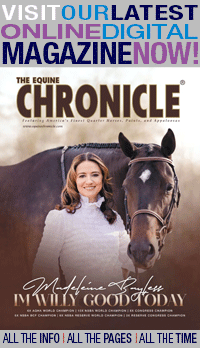New Legislation to Eliminate Soring Introduced in Senate
There are now bills in both the House and Senate to amend the Horse Protection Act to eliminate soring. On July 31, just before breaking for the August recess, Senators Kelly Ayotte (R-NH) and Mark Warner (D-VA) introduced the Prevent All Soring Tactics Act of 2013. The bill is intended to strengthen the Horse Protection Act (HPA), which was enacted in 1970 to prohibit the showing, exhibiting, transporting or sale at auction of a horse that has been sored.
The Senate bill is the same as the legislation already introduced in the House, which now has 137 cosponsors.
The U.S. Department of Agriculture (USDA) enforces the HPA. USDA deems soring to involve the use of action devices, chemicals, pads, or wedges to cause pain in a horse’s forelegs and produce an accentuated show gait for competition. According to the USDA, soring has been primarily used with Tennessee Walking Horses, Racking Horses, and Spotted Saddle Horses and continues despite the existence of a federal ban for over forty years.
The bill focuses on those breeds by amending the HPA to prohibit a Tennessee Walking Horse, a Racking Horse, or a Spotted Saddle Horse from being shown, exhibited, or auctioned with an action device, or a weighted shoe, pad, hoof band or other device if it is constructed to artificially alter the gait of the horse and is not strictly protective or therapeutic. These new prohibitions would not apply to other breeds and would not prohibit the use of therapeutic pads, or bell boots or quarter boots that are used as protective devices.
“The horse show industry has been living with the HPA for over 40 years. However, the base for USDA enforcement of the Act is the showing, exhibition, auction or transport of a sore horse,” said Jay Hickey, president of the American Horse Council (AHC), which supports the bill. “For this reason USDA has focused its efforts on those segments of the show community that involve breeds and activities that are most frequently involved in soring. If a breed or discipline is not soring its horses to exaggerate their gaits, then as a practical matter the Act has likely not adversely affected them and the bill to amend the Act, if passed, will not affect them any more than current law.”
The legislation would also increase fines and penalties for violations for soring, including the potential for a lifetime ban for repeat offenders.
The bill would create a new licensing process for horse show inspectors, eliminating the current program that uses industry-affiliated designated qualified persons (DQPs). This program has received criticism because DQPs are often not independent of the industry they are inspecting. Under the bill, USDA would be required to train and license the new independent inspectors for shows and other HPA-regulated activities that wish to hire an inspector. Licensed or accredited veterinarians would be given preference for these positions. The decision to hire an inspector, however, would still be up to the show, sale or auction. It would not be made mandatory. Shows or sales that employ DQPs now would begin using USDA-selected inspectors. Shows or sales that choose not to use DQPs now would not be required to use them should the bill pass.
“The AHC supports this legislation, as does the American Association of Equine Practitioners, the American Morgan Horse Association, the American Paint Horse Association, the Pinto Horse Association of America, the American Quarter Horse Association, the American Saddlebred Horse Association, the Appaloosa Horse club, the Arabian Horse Association, the Maryland Horse Council, the United Professional Horsemen’s Association, the American Veterinary Medical Association and other horse groups,” said Hickey. “The bill focuses on the problems it is intended to solve and does not adversely affect other segments of the show industry that are not soring horses and have no history of soring horses.”










